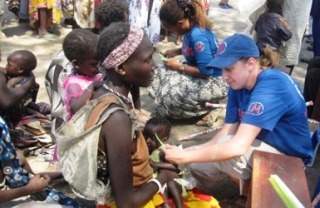ICRC steps up medical efforts in Jonglei’s Akobo county
February 10, 2013 (JUBA) – The International Committee of the Red Cross (ICRC) has deployed a rapid response surgical team to Akobo West county in South Sudan’s Jonglei state, after Friday’s attack left over 100 civilians dead and several injured.

“The team is now on the ground and due to operate on 13 wounded people. It stands ready to perform emergency surgery on other wounded people as the need arises,” ICRC said in the statement extended to Sudan Tribune.
Goyi Jooyul, the commissioner of Akobo country said Murle militia violently attacked unarmed civilians on their annual migration to cattle camps at Sobat River in Akobo West on 8 February.
He said the attackers killed 103 people, including 14 South Sudanese army (SPLA) soldiers, leaving eight soldiers and six civilians wounded. A number of women and children are reportedly missing following the attack.
Jooyul, largely blamed the attack on what he described as a “huge and heavily armed” group of uniformed and non-uniformed “criminals” believed to be from Murle tribe or the David Yau Yau rebel group operating in the volatile region.
Despite the Jonglei Peace initiative signed in May 2012, Akobo community in particular has reportedly suffered almost a dozen fatal attacks on its population, with the latest at Wanding on 25 December, in which three girls were abducted.
Separate attacks on Kuachar and Kier villages in January and February, led to the death of a child and the wounding of two women.
The commissioner, however, cited logistical challenges and inaccessible roads as major obstacles in efforts by the army to track down elements destabilising the remote area.
“There is no single road passable road through Lou land to aid the pursuit of criminals or even provide the needed food for the hungry populations. The costs for silence in Juba [the South Sudan capital] are enormous for inaction and consequences cannot be reemphasised,” he said.
He added, “I have called for flights to travel to Walgak (Akobo West) three weeks ago just to arrange the movement for more possible SPLA forces, but the bureaucracy failed me from our only capable UNMISS [United Nations Mission in South Sudan] partners in Juba, despite the importance emphasised by [the] Bor office”.
The importance of transparency in coordination and prioritisation, the commissioner stressed, could mitigate such incidents in the future and save lives.
(ST)
